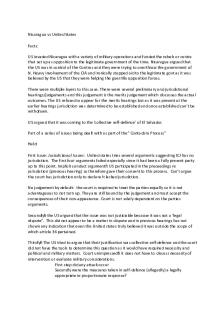Strong vs. Weak States- Reading PDF

| Title | Strong vs. Weak States- Reading |
|---|---|
| Author | Kaitlyn Robison |
| Course | Introduction to Comparative Politics |
| Institution | Oklahoma State University |
| Pages | 2 |
| File Size | 96.5 KB |
| File Type | |
| Total Downloads | 27 |
| Total Views | 168 |
Summary
Dr. Holley E. Hansen...
Description
Strong vs. Weak States: Reading O’Neil pages 46-58
Page 1
Vocabulary Legitimacy- a value whereby an institution is accepted by the public as right and proper, thus giving it authority and power Traditional legitimacy- legitimacy that accepts aspects of politics because they have been institutionalized over a long period of time Charismatic legitimacy- legitimacy built on the force of ideas embodied by an individual leader Rational-legal legitimacy- legitimacy based on a system of laws and procedures that are highly institutionalized Federalism- a system in which significant state powers, such as taxation, lawmaking, and security, are devoted to regional or local bodies Asymmetric federalism- when power is divided unevenly between regional bodies; for example, some regions are given greater power over taxation or language rights than others- a more likely outcome in a country with significant ethnic divisions Unitary state- a state in which most political power exists at a national level, with limited local authority Devolution- a process in which political power is ‘sent down’ to lower levels of state and government Strong states- a state that is able to fulfill basic tasks, such as defending territory, making and enforcing rules, collecting taxes, and managing the economy Weak states- a state that has difficulty fulfilling basic tasks, such as defending territory, making and enforcing rules, collecting taxes, and managing the economy Failed states- a state so weak that its political structures collapse, leading to anarchy and violence Capacity- the ability of a state to wield power to carry out basic tasks, such as defending territory, making and enforcing rules, collecting taxes, and managing the economy Autonomy- the ability of the state to wield its power independently of the public Comparing State Power States quickly eradicated every other form of political organization; not all states are the same Legitimacy Widely recognized by public; confers authority and power Assume state has authority over us Relies not on coercion but consent Does not depend on freedom or equality Comes from: traditional, charismatic, and rational-legal Traditional- it’s always been there; rituals and ceremonies Charismatic- based off the power of ideas or beliefs; Jesus & Muhammad- examples of charismatic figures & Hitler; commonly dies with individual who possesses it Rational-legal- based on system of laws and procedures; offices one hold more important than who you are Charismatic- Kim Jong II & Kim Jong Un, Gandhi, Mandela Centralization of Decentralization Federalism doesn’t have to be uniformed Asymmetric- power divided unevenly
Strong vs. Weak States: Reading O’Neil pages 46-58
Page 2
Unitary- power at national level Power, Autonomy, & Capacity Strong vs. weak Armed rivals to a state may control a large portion of territory or economy Unstable political environment Weak states: not institutionalized, lack authority and legitimacy Failed states like Iraq (2005) are usually backed by international force Capacity vs. autonomy o Capacity- requires money, organization, legitimacy, effective leadership o Autonomy- related to sovereignty; if a state wants to carry out policy, it can do so without consulting public o High autonomy- act based on public; o Low autonomy- private individuals/groups o High capacity and high autonomy- China (new rail roads, roads…) o High capacity and low autonomy- US & Canada individual freedom high o Low capacity and high autonomy- few limits, lack ability to realize policy- Russia Pakistan Quality of education and healthcare low, corruption high, unresponsive judicial system, military unaccountable Large number of terrorist deaths Osama bin Laden- did Pakistan’s military shelter him? Weak central authority = no control over violence Leaders want power for own interests Support terrorist attacks in India Unclear who has control of nuclear weapons Both India and Pakistan faced same issues in beginning Weak state, regime, and government left military powerful and unaccountable 10 Reasons Countries Fall Apart 1. North Korea- lack of property rights 2. Uzbekistan- forced labor 3. South Africa- a titled playing field 4. Egypt- the big men getting greedy 5. Austria & Russia- elites block new technologies 6. Somalia- no law and order 7. Colombia- a weak central government 8. Peru- bad public service 9. Bolivia- political exploitation 10. Sierra Leone- fighting over the spoils...
Similar Free PDFs

Strong vs. Weak States- Reading
- 2 Pages

Weak and strong syllables
- 5 Pages

FEA 03 Strong & Weak form
- 27 Pages

Nicaragua vs United States
- 6 Pages

Strong Acid Strong Base Lab
- 7 Pages

Mitosis vs meiosis reading
- 3 Pages

Melvin Strong- TCI
- 1 Pages

Weak theory
- 3 Pages

Pedagogia Forever Strong
- 1 Pages
Popular Institutions
- Tinajero National High School - Annex
- Politeknik Caltex Riau
- Yokohama City University
- SGT University
- University of Al-Qadisiyah
- Divine Word College of Vigan
- Techniek College Rotterdam
- Universidade de Santiago
- Universiti Teknologi MARA Cawangan Johor Kampus Pasir Gudang
- Poltekkes Kemenkes Yogyakarta
- Baguio City National High School
- Colegio san marcos
- preparatoria uno
- Centro de Bachillerato Tecnológico Industrial y de Servicios No. 107
- Dalian Maritime University
- Quang Trung Secondary School
- Colegio Tecnológico en Informática
- Corporación Regional de Educación Superior
- Grupo CEDVA
- Dar Al Uloom University
- Centro de Estudios Preuniversitarios de la Universidad Nacional de Ingeniería
- 上智大学
- Aakash International School, Nuna Majara
- San Felipe Neri Catholic School
- Kang Chiao International School - New Taipei City
- Misamis Occidental National High School
- Institución Educativa Escuela Normal Juan Ladrilleros
- Kolehiyo ng Pantukan
- Batanes State College
- Instituto Continental
- Sekolah Menengah Kejuruan Kesehatan Kaltara (Tarakan)
- Colegio de La Inmaculada Concepcion - Cebu






